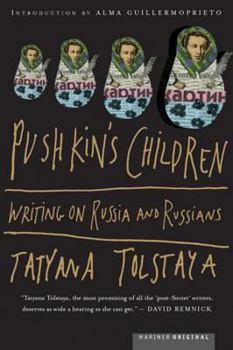Pushkin's Children: Writing on Russia and Russians
Select Format
Select Condition 
Book Overview
These twenty pieces address the politics, culture, and literature of Russia with both flair and erudition. Passionate and opinionated, often funny, and using ample material from daily life to underline their ideas and observations, Tatyana Tolstaya's essays range across a variety of subjects. They move in one unique voice from Soviet women, classical Russian cooking, and the bliss of snow to the effect of Pushkin and freedom on Russia writers;...
Format:Paperback
Language:English
ISBN:0618125000
ISBN13:9780618125005
Release Date:January 2003
Publisher:Houghton Mifflin
Length:256 Pages
Weight:4.85 lbs.
Dimensions:0.7" x 5.5" x 8.6"
Customer Reviews
3 ratings
In search of the Russian soul
Published by Thriftbooks.com User , 21 years ago
Tolstaya demonstrates just how hard it is to size Russians up in a collection of book reviews and essays on the Russian character. These stories sparkle with many telling anecdotes, drifting back and forth over time. Pushkin has long held a dear place in the Russian heart because of his "inner freedom," Tolstaya noted. The unconquerable spirit that managed to survive one regime after another over the centuries.Book reviews dominate this collection, from her appreciation of Robert Conquest's The Great Terror to her witty dismissal of Gail Sheehy's book on Gorbachev. She also takes aim at Russian authors, in particular the cult that formed around Solzhenitsyn. The Russian soul is something that continually eludes authors. Exceedingly hard to pin down as is the Russian language.Jamey Gambrell worked with Tolstaya on this translation, giving it the character of her voice. Although most of the pieces were written during the death throes of the Soviet Union, her observations are still timely and present a compelling portrait of Russia in transition. She takes a stab at the enigmatic Vladimir Putin and the events that led up to his ascension to power. She packs into these essays more meat than many scholars do in their massive tomes on Russia. It is a voice that is both fresh and enlightening.
Not stupid, but really funny
Published by Thriftbooks.com User , 21 years ago
Intellectuals have problems fitting in with the big buddies in the world. This might be more true in Russia during the last few centuries than elsewhere, but PUSHKIN'S CHILDREN by Tatyana Tolstaya does not have an index, in which to look up Lenin, for his opinion on the intelligentsia, to illustrate the point. The intellectual freedoms which literary people in Russia had been seeking since the time of Herzen were finally granted by Gorbachev. But then the Partocracy, "accustomed to doing nothing concrete, to producing a lot of empty talk, they were shaken from their usual rut by the very mystery of what was happening. They were so baffled that it was easy to sweep them from their posts. When someone has fainted, you can quickly throw them out the door." (p. 44). People who live in democracies should recognize the ability of voters to do this to rulers on a regular basis, if the voters have enough reason and are given the opportunity.In the case of Gorbachev, the larger question of how he managed to preside over the collapse of an empire and an economic system is of unusual interest for people in democracies whose outlooks for wealth are not stable. Tolstaya pictures the intelligentsia as being too moral to grasp the downside of what would happen when "Gorbachev made his first, and perhaps his most serious, mistake. He forbade the people to drink. "The intelligentsia forgave him for this (they were `moved by their own perdition'). The Partocracy was happy. Here was a concrete task, and a familiar one: to fight, to root out, to fire people from their jobs. They set to tearing out grape vines, paving over rare vinyards in the Crimea, uprooting muscat so fine and expensive that `the people' couldn't get near it. They only counted the monstrous losses when the campaign was over. During the campaign, however, people cursed Gorbachev, bought up all the sugar, perfected their knowledge of moonshine manufacture, and most important of all, grasped that they could do everything their own way and not get caught or punished. An epidemic of hoarding began. Sugar, soap, matches, and lightbulbs disappeared, and then sheets and pillows, and then clothes, shoes, eggs, and finally bread." (p. 45).Most of the people in the world live in countries where they do not need to depend on their government to supply them with such items, and even the United States, rich as it is in so many ways, might expect to be able to conquer anyplace it chooses without having to furnish such items to everybody. Even the current road map might appear to create a state for the Palestinians in an area in which Jewish settlements are the hoarders of anything they might really want. Long before, this book, PUSHKIN'S CHILDREN, starts with a book review of SOVIET WOMEN: WALKING THE TIGHTROPE, by Francine du Plessix Gray, in which reality conforms to the old maxim, "Women can do everything, and men do all the rest." (p. 3). War and prison camps kept men away from homes
wonderful
Published by Thriftbooks.com User , 21 years ago
This is a wonderful collection of essays. Tolstaya is sharp, opinionated, and savvy. Full of insight into contemporary Russia -- its leaders and its people.





